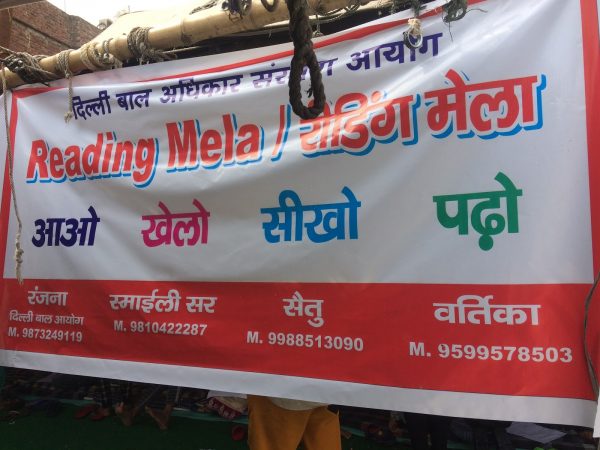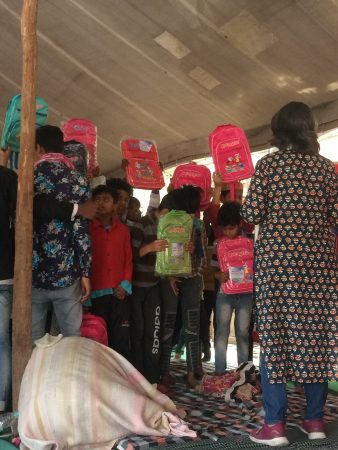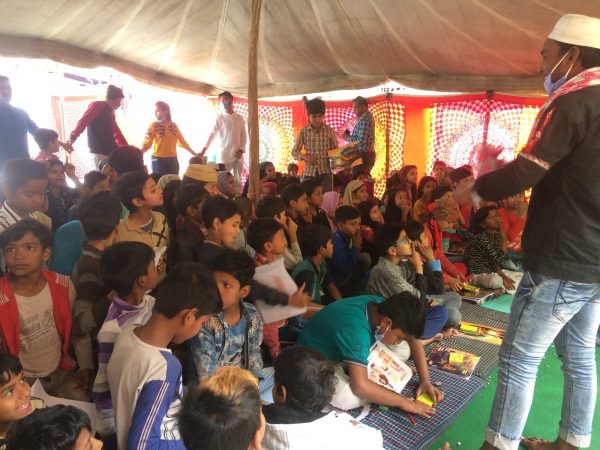A ‘Reading Mela—Aao, Khelo, Sikho, Padho’ organised at the Eidgah relief camp in Mustafabad has brought a smile on the faces of children, who haven’t gone to school since the violence broke out in Northeast Delhi.
“Mera school to jal gya hai (my school is burnt),” said Ayan, as he filled in the colours of the National Flag in his drawing book.
8-year old Ayan hails from Shiv Vihar, and is living with his mother, sisters and brothers in the relief camp. He was reluctant to talk, but said he is happy as he has gotten books, colours and pencils. He showed me an earlier sketch of his – of a house; reminiscent perhaps of his own home that was lost in the riots.
The classes are taking place every day in the morning, and continuing despite heavy rainfall in Delhi. The unpredictable weather has added to the hardships of the people at Mustafabad relief camp.
Farman, a class 9 student staying at the camp, said that classes continued despite heavy rains. The makeshift school is attempting to complete the school syllabus and remain on track, as exams are scheduled for as soon as schools open after Holi.
Farhan, who is interested in persuading literature in the future said: “I started studying at the Reading Mela classes and I like it. It is almost like school and I can prepare for exams. They’ll also distribute school books in the coming days.”
More than 170 children attend the classes organised by Delhi Commission for Protection of Child Rights (DCPC) at the Mustafabad relief camp. Students gather at a designated area in the Eidgah complex, accompanied by a number of volunteers who were supervising activities such as drawing, writing, reading and other interactive sessions.
Nargis, a class 8 student, who attended the very first class at the camp, shared her experience. “It was very good as we did a lot of activities. I will attend it every day.”
Another student of class 9, Sadiya said: “I am happy that I can start my studies again. From the past few days, I haven’t attended school. Now, I can resume my studies in these classes.”

Children were given basics like books, pens, pencils and school bags. The classes aim to replicate the school environment for these children – to bring a semblance of normalcy in their disrupted lives. The classes included students all the way from class 1 upto 12, making it more like a hub for building self-confidence rather than only completing the school curriculum.
Out of all the activities, drawing classes are the clear favourite amongst the children in the relief camp. Almost every child can be seen drawing or colouring. Most of them drew the National flag.
Since violence first broke out, schools remained closed in riots affected areas in Northeast Delhi. The annual school examinations have been postponed to after Holi, when schools in the area are set to re-open.
In the meanwhile, classes at the camp are keeping children on track with their studies, with an additional focus to keep the children engaged. One of the volunteers from DCPC explained that the classes are organised so that students do not fall behind. The volunteer said: “We had baseline assessment tests for every child to judge their academic progression. Accordingly, we can segregate and process their studies in the manner that is needed for them.”
The classes at the camp have served as an ice breaker for the volunteers and children, helping the children cope perhaps with the trauma they have faced. “But still, one in every 15 children seems depressed and is not yet ready to mingle with others,” the volunteer estimates.
Ranjana, a member of DCPC said: “We have identified the children in the camp and in which classes they are studying. Accordingly, we are imparting lessons to complete their school curriculum as well as organising interacting sessions so that the children can come out from the trauma.”






